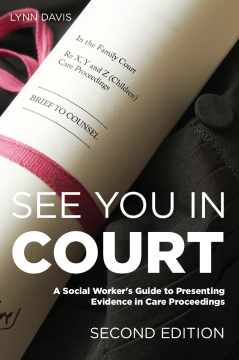
Additional Information
Book Details
Abstract
Now fully revised and updated, See You in Court is an accessible guide for social workers on being a witness in care proceedings.
This book de-mystifies the court system explaining court structures and procedures, roles and responsibilities and basic rules of evidence. It considers how to present effective written evidence as well as preparing for the court day itself. It answers questions frequently asked by social workers on how to present oral evidence including how to deal with cross-examination. The material is supported by case studies and checklists. Updates to the second edition reflect recent changes to the family court system, a revised Public Law Outline and the increased recognition of social workers as experts in their own right.
An essential addition to every social worker's bookshelf, particularly those working with children and families.
This book provides an accessible guide for social workers involved in care proceedings. It will be essential reading for ASYE social workers as it takes you through each step of the court process and answers many of the questions that newly qualified social workers have such as providing written reports and evidence for court. The section on the Public Law Outline is clear and well explained and reflects practice 'on the ground'. The risk with a book such as this is that it is seen as being relevant only to those new to the profession, however, I found it to be a useful refresher and will keep it as a reference point. This book will appeal to a broad readership that includes NQSW, students and practitioners in multi-agency settings involved in care planning and the courts.
Lee Pardy-Mclaughlin, Principal Child and Family Social Worker, Staffordshire County Council and Mark Brown, Team Coordinator, Stafford Care Planning & Court Team
Lynn Davis is an independent legal trainer and consultant. She has specialised in child care law since 1989, and has acted as a solicitor for local authorities, parents and children. She regularly provides legal training for professionals working with children and has taught on the law module for student social workers. She is the author of The Social Worker's Guide to Children and Families Law and A Practical Guide to Fostering Law: Fostering Regulations, Child Care Law and the Youth Justice System.
What is really special about this book is that whilst Lynn Davis herself is a legal professional, she manages to write from the perspective of a social worker, immersing herself in our world and how we experience family law and the courts. Why, the first chapter even focuses on feelings - very much 'home territory' for social workers! I would highly recommend this book particularly to newly qualified social workers and students as its content is extremely accessible and Davis skilfully journeys with the reader in the family justice arena providing invaluable insights, guidance and advice every step of the way. There are not many books that are able to transfer the dynamic experience of training into the written word - I believe that this one has gone some way in doing this thanks to Davis' credentials as a trainer. At a time that some have billed as a new era for social workers involved in care proceedings this book could prove to be a very welcome companion.
Nushra Mansuri, Professional Officer (BASW England)
This second edition updates guidance for social workers giving evidence in the Family Court in the light of recent family justice reform, Children & Families Act 2014 and recent case law. It is an excellent practical resource for newly qualified social workers, those new to court work or those who need to refresh their knowledge. This book also clarifies the difference between criminal and care proceedings in child protection cases with plenty of relevant examples. It contains everything you need to know about presenting evidence both in writing and in person based on solid practice experience. There are good examples throughout and especially helpful appendices with examples of cross-examination and observation feedback to help learning and professional development. I highly recommend this book.
Celia Parker, Principal Social Worker, London Borough Southwark
